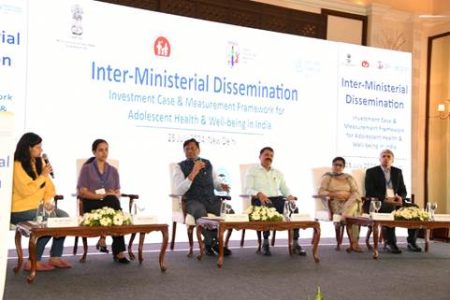New Delhi: India reaffirmed its dedication to nurturing and empowering its adolescent population with the launch of the “Economic Case for Investment in the Well-being of Adolescents in India” report. Unveiled today, the report underscores significant advancements in adolescent well-being across the nation, aligning with global findings presented in the “Adolescents in a Changing World – The Case for Urgent Investment,” commissioned by the Partnership for Maternal, Newborn & Child Health (PMNCH) and released at the 77th World Health Assembly in Geneva.
Union Health Secretary Shri Apurva Chandra, speaking at the event, emphasized India’s pivotal role as home to the world’s largest adolescent population, numbering 253 million. “Our adolescents are the backbone of our future, embodying the promise of a vibrant and progressive nation,” Chandra stated. He underscored the importance of ensuring the health, education, and empowerment of adolescents to achieve national and international development goals, including the Sustainable Development Goals (SDGs).
Chandra highlighted India’s innovative programs targeting adolescent well-being, including the Rashtriya Kishor Swasthya Karyakram (RKSK), which focuses on reaching adolescents from diverse backgrounds. He also discussed initiatives such as the School Health and Wellness Programme under Ayushman Bharat and the Scheme for Promotion of Menstrual Hygiene, aimed at increasing health awareness and promoting hygiene practices among adolescent girls. “By fostering partnerships with NGOs, community leaders, and international agencies, we aim to amplify our efforts and reach every adolescent, regardless of their socio-economic background,” Chandra added.
The report also introduced the forthcoming U-WIN platform, modeled after the Co-WIN platform, designed to digitize and monitor health records for every child, marking a transformative step in healthcare.
Shri Anandrao V. Patil, Additional Secretary, Ministry of Education, highlighted the increased budgetary allocation for school education and curriculum enhancements to improve skills from the 6th grade onwards. He emphasized the government’s special efforts towards children with special needs, girl education, and mid-day meals, alongside promoting menstrual hygiene in schools.
Rajat Khosla, Executive Director of PMNCH, commended India’s efforts, noting that adolescents, comprising 1.5 billion globally, represent a significant demographic. He applauded the Indian government’s Rs. 2 lakh crore budgetary allocation for adolescent well-being in the Union Budget 2024-25, emphasizing the economic and social imperatives of investing in adolescents.
Dr. Rodrigo H. Ofrin, WHO Representative to India, lauded India’s achievements in health indicators and the convergence of various government schemes enhancing adolescent well-being. “Investing in adolescents leads to smart investment in the nation’s future,” he remarked.
Prof. Bruce Rasmussen, Director of the Victoria Institute of Strategic Economic Studies, Victoria University, presented the key findings of the Investment Case for Adolescent Health & Wellbeing. He highlighted significant progress across five domains of adolescent well-being and stressed the economic benefits of government interventions in education, skill development, and reducing child marriage and road accidents.
The event also featured insights from Dr. Yatan Pal Singh Balhara of AIIMS New Delhi, who noted a paradigm shift in India’s approach to mental health, and Dr. Reena Yadav of Lady Hardinge Medical College, who emphasized the need for education and privacy in counseling adolescents on sexual and reproductive health issues.
Youth Representative Priya Rathore shared her experiences working with adolescent women facing challenges such as child marriage, calling for increased monitoring and awareness initiatives in rural and economically backward areas.
Aradhana Patnaik, Additional Secretary and MD (NHM) of the Health Ministry, along with senior officials of the Union Health Ministry, attended the event, underscoring the government’s commitment to fostering an inclusive and supportive environment for India’s youth.

